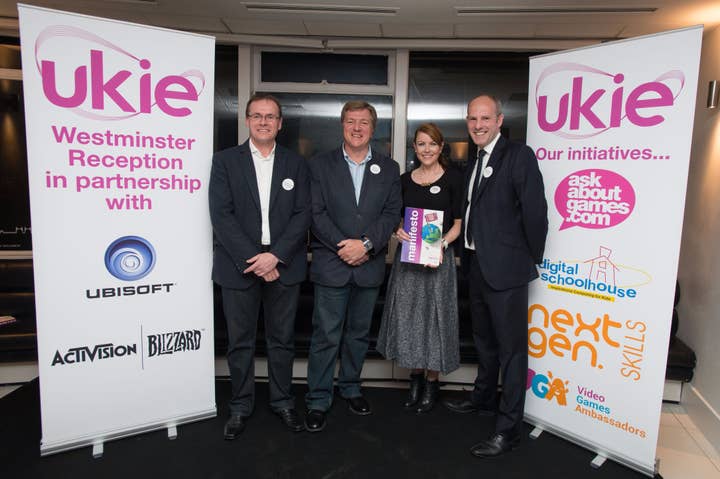Tax breaks and Talent: 5 years with the coalition
Jo Twist on what the election means for the UK's industry
This week marks the official beginning of the General Election campaign to decide the government for the next five years. When people ask if politics matters, games companies can say with confidence it matters very much, and not just at election time.
Five years ago we were an organisation called ELSPA which had 41 members, mainly publishers. Four years ago we changed to be Ukie, still funded in large part by people who join the network, but acting on behalf of the whole diverse sector. Today we have 260 members, the majority of whom are developers and self-publishers, and we regularly engage with over 1200 games companies, entrepreneurial individuals in the industry, as well as other sectors.
Over this period there has been rapid growth in our sector. We know from our Map of the Games Industry work with NESTA that between 2011 and 2013 the number of games companies grew 22% per annum. Strong games clusters exist in 18 areas across the UK, not just London and the South East.
In 2010 there was also great uncertainty about whether the games industry would have the competitive edge enjoyed elsewhere in the world. The Video Games Tax Relief announced by the previous Labour government just three months earlier was scrapped in June 2010. Thanks to coordinated lobbying of Ministers with the sector, this position was reversed within two years when the Chancellor announced tax breaks alongside similar reliefs for high-end TV productions and animation in March 2012.
"In 2010 there was also great uncertainty about whether the games industry would have the competitive edge enjoyed elsewhere in the world"
Today we're starting to see some great benefits from this scheme. January saw news that 32 games had already received approval for the relief, with a projected UK spend between them of £47 million - bringing direct benefit to the UK games sector and to the economy more widely. And that was only in the first six months of the scheme. You can read more about games tax relief here.
The final Budget of this government, in March this year, saw the announcement of the Video Games Prototype Fund and the extension of the Skills Investment Fund to align with tax breaks, for which we lobbied directly in our manifesto and in communications with the Treasury before the Budget and last year's Autumn Statement.
Five years ago there was real concern whether UK schools were geared up to meet the demands of the industry for transferable 21st century skills. Ed Vaizey, then Culture, Communications and Creative Industries Minister, commissioned Ian Livingstone and Alex Hope with Nesta to conduct a review into the skills needs of the games and VFX industries. The Next Gen report, published in February 2011, recommended major reforms to the teaching of art and computer science. Since September 2014 children are being taught computing with the skills that games companies and the wider tech and digital creative sector will need in future.
We know this with confidence because our Digital Schoolhouse programme is making a difference in London schools, funded by the Mayor of London, by mapping games to the new curriculum and creating exciting new lessons and training a new generation of teachers who can inspire children from all backgrounds, especially girls, into the digital economy.
"In the course of this Parliament we have responded to over 40 government consultations, on issues as wide as consumer rights, immigration, data protection, copyright law, measuring the creative industries and promoting diversity"
Five years ago the key issue in tech was the implementation of the Digital Economy Act. Today, tech policy is a far wider debate. In the course of this Parliament we have responded to over 40 government consultations, on issues as wide as consumer rights, immigration, data protection, copyright law, measuring the creative industries and promoting diversity.
We've been involved in major government-industry initiatives including the Creative Industries Council, the UK Council for Child Internet Safety, and UK Trade and Investment's Sector Advisory Group. And we have worked constantly over these five years to raise our industry's profile in Parliament, with regular meetings with MPs, roundtable discussions, and big events in Westminster and at party conferences.
Politics is not just about election time, it's about constantly making sure our voice as a sector which will fuel the cultural and economic health of the country is heard: seizing opportunities, tackling misconceptions and looking to support, grow and promote UK games businesses here and across the globe.
